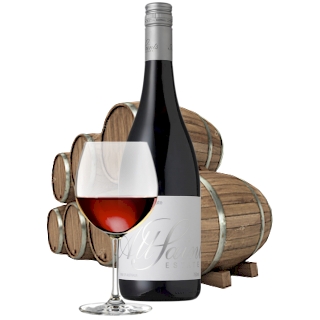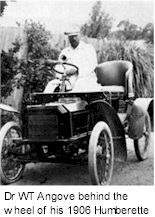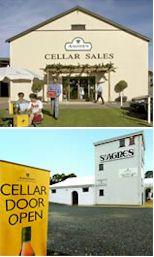


The origins of Angove's as a company have more to do with satisfying a way of life rather than a determination to establish a wine and brandy producing business. Dr. William Angove, an accomplished general practitioner and surgeon with his wife and young family, emigrated from Cornwall in 1886 to establish a medical practice in South Australia. His early experimentation with vines, winemaking and distilling, led to the establishment of a proud family business. Dr. Angove's initial plantings at the township of Tea Tree Gully in the Adelaide foothills were the forerunner of one of the largest vineyards in the southern hemisphere - the magnificent Nanya Vineyard at Renmark in South Australia's Riverland.

Early vintages of wine, a Burgundy styled dry red, from the original Tea Tree Gully vineyard proved to be popular with the local community. Steady expansion of the vineyard and the building of a winery and cellars of local stone meant that, by the turn of the century, production reached 300 tonnes of grapes from some 50 acres of land under vines. During that period the accent on red wine was gradually supplemented by the production of dry white wines as well as wines in the sherry and port styles.
Stills and a large steam boiler were installed for production of fortifying spirit by Angove's eldest son, Thomas Skipper Angove, who while completing studies in Oenolegy at Roseworthy College, branched out from the family home in Tea Tree Gully and set up a distillery and processing house at Renmark in South Australia's Riverland region in 1910.
Despite the disruptions of two wars, growth of the Renmark operation progressed as well as developing a fine reputation for table and fortified wines. The renowned St. Agnes had become a hallmark for quality brandy in Australia and a number of export markets. Since World War II, the company has steadily expanded its operations and structure. The Renmark facility has grown to become a major winemaking and distilling entity with storage capacity for more than 15 million litres of wine and spirit. In 1947, Thomas William Carlyon Angove, grandson of the founder, took the helm as Managing Director, beginning a new era in development.

Progressively, equipment, crushing facilities, modern winemaking plant and cooling systems have been renewed and added, enabling the company to develop methods in premium red and white table wine production. In 1983, the fourth generation of the family took control, when John Carlyon Angove succeeded his father as Managing Director of the company.
John has taken up where his father left off, with increased development and investment in all aspects of the winery. From redevelopment of Nanya Vineyard to increased storage capacity and a state of the art packaging facility, all housed on the Angove Estate at Renmark. A renewed focus towards sales and marketing has seen the development of an Australian based sales force servicing the domestic trade, and expansion of Angove's export activities to the point where Angove's wines can be found in over 30 different countries around the globe.
Today the vineyard contains 19 grape varieties. As part of Angove's continuing efforts toward quality grape and wine production, the vineyard team is undertaking an enormous project of redeveloping the entire 1300 acre vineyard over a 10 year period. The redevelopment involves removal of the old overhead sprinkler irrigation system and bulldozing of the old wide T trellis and vines. Starting from scratch with a bare paddock the row direction is being turned around 90 degrees, running east-west, with rows surveyed and deep ripped.
The picking operation at the Nanya Vineyard is a mammoth one, and all vines have been trellised to enable mechanical harvesting. Harvesting is carried out at night and in the early morning to ensure the fruit is as fresh and cool as possible when it is transported to the winery for crushing and processing. Angove’s utilises our own mechanical harvesters to harvest much of the fruit with contractors called in during the rush to pick all of the fruit at optimum levels of flavour and sugar ripeness.
